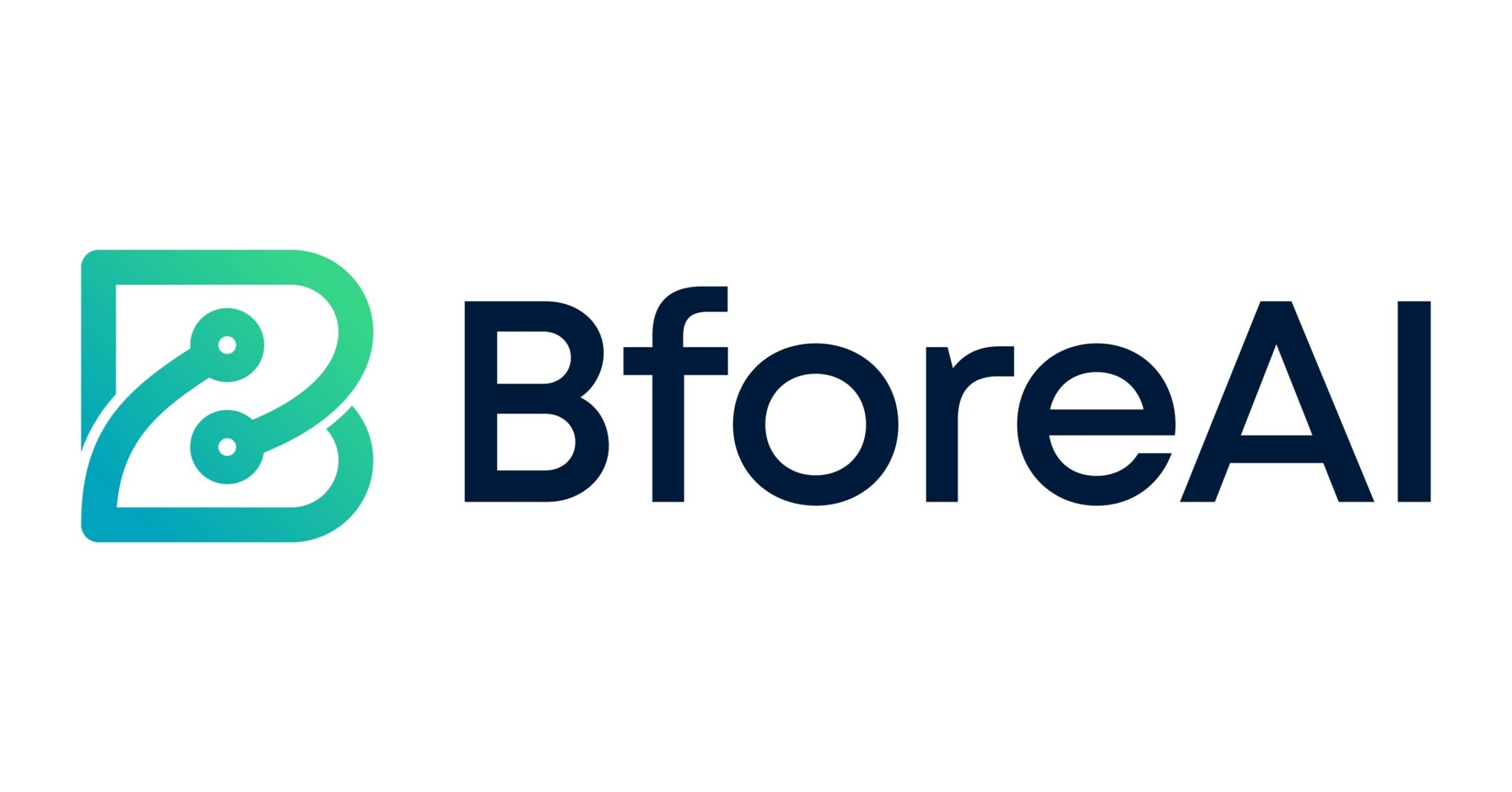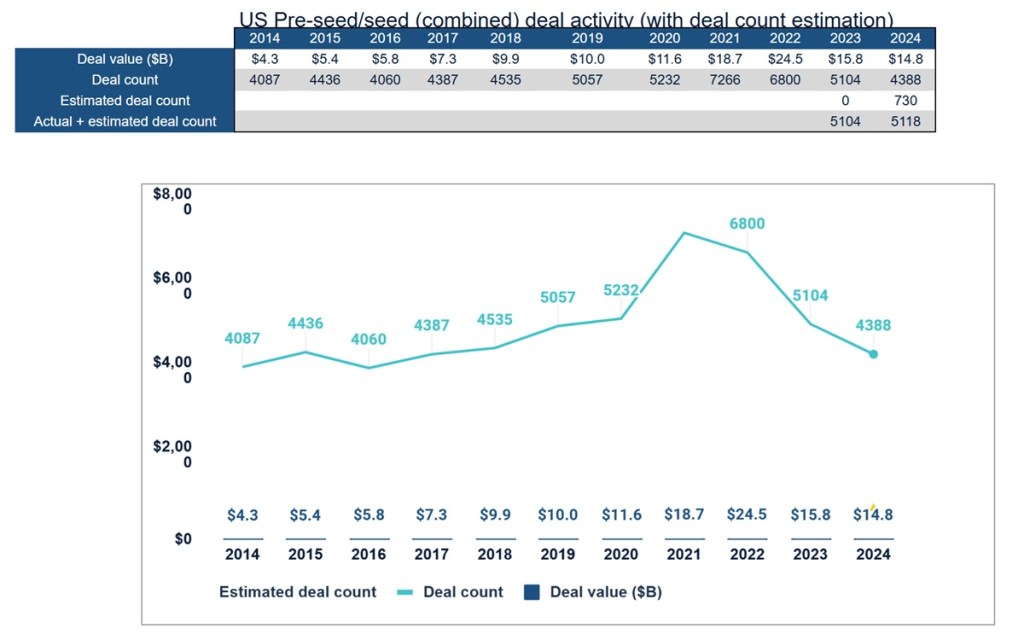The digital health sector raked in $10.1 billion in venture funding in 2024, down from $10.8 billion in 2023 but higher than 2019’s funding total.
There were 497 digital health funding deals last year, compared to 503 deals in 2023.
Digital health startups brought in $1.8 billion in VC funding across 118 deals in the fourth quarter, according to Rock Health’s 2024 digital health funding report released Monday. In 2019, before the COVID-19-fueled funding boom, digital health venture funding reached $8.2 billion in 425 deals.
In 2020, funding for digital health companies raked in $14.3 billion, then venture funding skyrocketed to $29.2 billion in 2021 followed by $15.7 billion raised in 2022.
2024’s lower funding pot was influenced by investors’ focus on earlier-stage funding, as well as a pullback on later-stage check sizes, Rock Health research analysts Adriana Krasniansky, Sari Kaganoff and Tiffany Ramos wrote in the report.
The average deal size last year was $20.4 million, about on par with 2019 when the average deal size was $19.3 million. That compares to the average deal size of $21.5 million in 2023, $26.5 million in 2022, $39.5 million in 2021 and $30.2 million in 2022.
Rock Health, a venture fund dedicated to digital health, outlined a number of key trends that shaped digital health investment in 2024: a handful of large, more established players dominated healthcare innovation headlines and heavyweight investors drove sector dealmaking, with mega funds like Andreessen Horowitz and General Catalyst leading the transaction count.
2024 funding was concentrated into already popular value propositions and therapeutic areas, including nonclinical workflow, mental health and obesity care.
“These dual trends—early-stage startup activity amidst big moves by large healthcare players—have created a David and Goliath dynamic in the healthcare innovation landscape,” Krasniansky, Kaganoff and Ramos wrote in the report. “We see a future where David and Goliath can coexist, and even thrive together, to drive impactful change in healthcare. Achieving this vision will require that all parties understand their roles and opportunities for symbiotic relationships in the market.
Early-stage investment activity was the name of the game
Sixty-three percent of 2024’s funding rounds were labeled, an uptick from 57% in 2023. Of these labeled deals, 86% supported startups raising their seed, series A and series B rounds, according to Rock Health data.
“This concentration signals that investors are betting on younger companies, some of which have less capital-intensive needs or are free from the valuation baggage of 2020-2022 fundraising,” Rock Health analysts wrote.
Notable early-stage deals included clinical decision software company Regard picking up $61 million in series B funding in July, and Tuesday Health nabbing a $60 million strategic investment to launch supportive care solutions for seriously ill Medicare patients.
Digital health companies that raised later-stage rounds in 2024 did so at smaller check sizes compared to previous years. Median deal size for series C and D fundraises clocked in at $50 million and $55 million respectively—larger drops from 2023’s $62 million and $58 million, and big drops from 2021 highs of $73 million and $105 million.
2024’s decline in later-stage funding also corresponds with a decline in mega deals, or fundraises over $100 million.
There were 17 mega deals last year, accounting for 21% of the year’s overall sector funding. In 2021, mega rounds made up 56% of total funding, dropping to 38% in 2022 and then 32% last year.
Later-stage startups struggling with downward valuation pressures or stalled fundraising rounds could fold or seek acquisition in the coming year, which could help reinvigorate digital health M&A activity this year, Rock Health analysts noted.
“Many late-stage players spent significant capital developing and piloting their solutions but weren’t able to clear the necessary hurdles to operate sustainably at scale. Today’s decrease in late-stage investments will likely lead to more M&A in the near future. These acquisitions may not be ‘champagne popping’ events, but they will streamline operations and free up founders to eventually start a new crop of digital health companies,” said Lawrence M. Chu, co-chair of Global M&A at Goodwin, as cited in the report.
Another key trend in VC funding is the continued dominance of investor “heavyweights.” Of the 391 VC firms in the U.S. venture market, 30 funds raised 75% of all of 2024’s committed capital in the U.S., and just nine of those funds accounted for 50%, according to Pitchbook data.
These “mega funds,” or VC firms with at least $500 million to deploy, together captured 20% of all committed LP capital in the U.S. venture market in 2024, Pitchbook reported in December.
Two of these mega funds, Andreessen Horowitz (a16z) and General Catalyst (GC), were digital health’s top investors in 2024, based on disclosed investor syndicates.
AI investment reaches a fever pitch
At the same time, these “mega funds” also are placing big bets on healthcare AI startups and could have a large influence on the markets they are investing in, according to Rock Health.
General Catalyst is backing Hippocratic AI, a startup that aims to build out what it refers to as the first large language model for healthcare with an initial focus on non-diagnostic, patient-facing applications. a16z, meanwhile, invested in Infinitus, a company building an AI platform specifically designed to automate healthcare phone calls and data gathering. Infinitus scored a $51.5 million series C round last year.
General Catalyst also made waves when it announced plans to buy a health system. The firm’s Health Assurance Transformation Corporation (HATCo) signed a definitive agreement in November to buy Summa Health for $485 million. The firm also is forming symbiotic relationships with national healthcare partners like HCA.
These opportunities enable GC to “carve out ‘test drive’ opportunities for its investments,” Rock Health said.
“Mega funds can also provide capital for their port cos to acquire other players, consolidating influence within key sector categories,” the Rock Health analysts wrote.
Healthcare AI startups are driving big investments in digital health. Funding for AI-enabled digital health startups comprised 37% of the year’s overall sector funding across 191 deals, according to Rock Health.
Analysts noted increasing concentration among digital health companies building on foundation large language models to develop enterprise tech stacks.
Goliaths in this space include incumbent software providers like Epic and Cerner, healthcare divisions of Big Tech players like Microsoft and digital health companies that have raised enough capital to compete like Commure and Abridge. “These companies have stood up complex AI architectures for large healthcare customers, tend to address multiple use cases, and frequently complete custom builds and integrations with other software, meeting strict compliance and privacy requirements, and often partnering with one another,” the Rock Health analysts wrote.
But there is room for smaller startups to grow, particularly for AI solutions that address specialized use cases or those that work with smaller customer segments like independent practices.
“Historically, small- and medium-sized businesses weren’t perceived as big enough markets against which health tech players could justify standing up a direct salesforce. However, a crop of current healthcare generative AI players have implemented viable go-to-market strategies pursuing ‘down market’ SMB buyers,” said Julie Yoo, general partner at a16z Bio + Health, as cited in the report. “These buyers want gen AI capabilities, but aren’t top-priority customers for larger IT players, and since gen AI products generally have a lower implementation burden, it’s a win-win opportunity for startups and smaller players.”
Top funded clinical indications continue to be mental health ($1.4 billion raised), cardiovascular ($1 billion), oncology ($700 million), weight management and obesity ($700 million), driven in large part by excitement around GLP-1 drugs, and reproductive and maternal health ($600 million).
Top funded value propositions were treatment of disease ($1.9 billion raised), non-clinical workflow ($1.8 billion), monitoring of disease ($1.4 billion), on-demand healthcare ($1.3 billion) and clinical workflow ($1.2 billion).
Strategic M&A in the digital health sector
Large healthcare customers are looking for vendors that can address multiple pressing needs. This is driving digital health companies to make efforts to expand across value propositions and therapeutic areas.
Rock Health analysts noted a trend in Q3 where digital health companies are using M&A to integrate new features and capabilities into their offerings. These deals create offerings that are more robust and address a broader range of customer needs.
Case in point: Health tech company Commure, which merged with Athelas in 2023 in a $6 billion deal, went deeper into clinical workflow with its acquisitions of Augmedix and Memora. The Augmedix deal gives it a foothold in the AI medical scribe market as the sector gets increasingly competitive.
Other examples of this kind of dealmaking in 2024 include chronic condition management player DarioHealth buying Twill to expand its mental health offering and acquire new patient engagement features.
Fabric Health, previously named Florence, made four acquisitions in the past two years to expand into a larger virtual care platform. In April 2023, it picked up Zipnosis from Bright Health in an all-cash deal to expand its asynchronous virtual care capabilities, and, in January, the company bought conversational AI assistant Gyant, another all-cash deal, to expand its “digital front door” for patients. It then purchased Walmart’s MeMD telehealth business and bought TeamHealth’s nationwide virtual provider network for telehealth staffing. Each of these acquisitions contributes to Fabric’s growing feature set.
Rock Health analysts expect more M&A deals in 2025 as digital health companies look to add on capabilities that address more of their customers’ use cases.












Leave a Reply